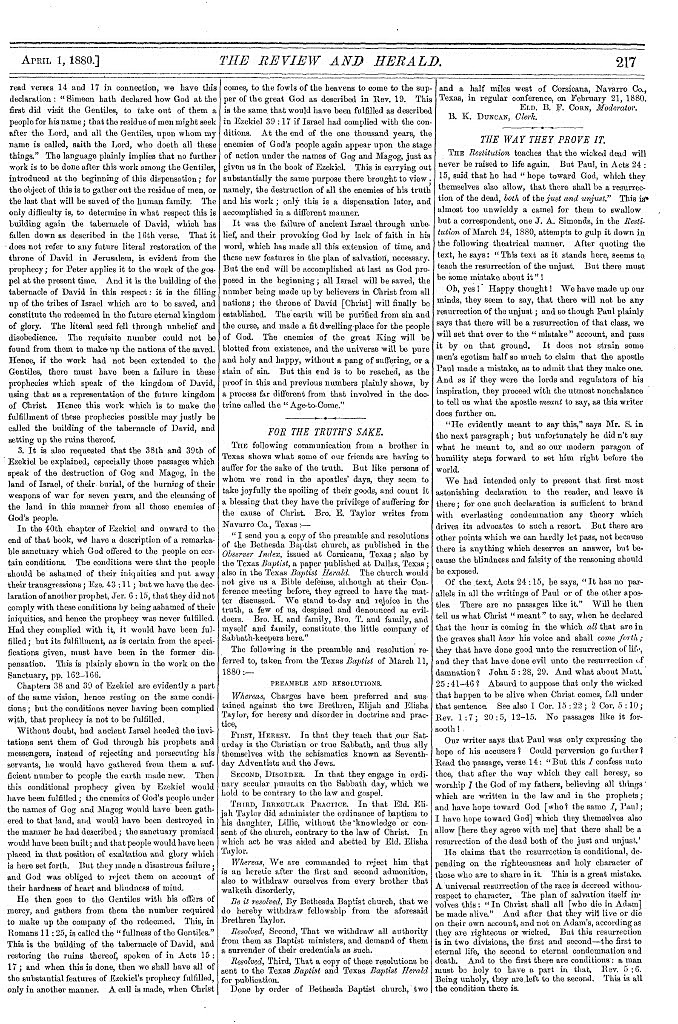“It is also requested that the 38th and 39th of Ezekiel be explained, especially those passages which speak of the destruction of Gog and Magog, in the land of Israel, of their burial, of the burning of their weapons of war for seven years, and the cleansing of the land in this manner from all those enemies of God’s people.
In the 40th chapter of Ezekiel and onward to the end of that book, we have a description of a remarkable sanctuary which God offered to the people on certain conditions. The conditions were that he people should be ashamed of their iniquities and put away their transgressions; Eze. 43:11; but we have the declaration of another prophet, Jer. 6:15, that they did not comply with these conditions by being ashamed of their iniquities, and hence the prophecy was never fulfilled. Had they complied with it, it would have been fulfilled; but its fulfillment, as is certain from the specifications given, must have been in the former dispensation. This is plainly shown in the work on the Sanctuary, pp. 162-166.
Chapters 38 and 39 of Ezekiel are evidently a part of the same vision, hence resting on the same conditions; but the conditions never having been complied with, that prophecy is not to be fulfilled.
Without doubt, had ancient Israel heeded the invitations sent them of God through his prophets and messengers, instead of rejecting and persecuting his servants, he would have gathered from them a sufficient number to people the earth made new. Then this conditional prophecy given by Ezekiel would have been fulfilled; the enemies of God’s people under the names of Gog and Magog would have been gathered to that land, and would have been destroyed in the manner he had described; the sanctuary promised would have been built; and that people would have been placed in that position of exaltation and glory which is here set forth. But they made a disastrous failure; and God was obliged to reject them on account of their hardness of heart and blindness of mind.
He then goes to the Gentiles with his offers of mercy, and gathers from them the number required to make up the company of the redeemed. This, in Romans 11 : 25, is called the “fullness of the Gentiles.” This is the building of the tabernacle of David, and restoring the ruins thereof, spoken of in Acts 15:17; and when this is done, then we shall have all of the substantial features of Ezekiel’s prophecy fulfilled, only in another manner. A call is made, when Christ comes, to the fowls of the heavens to come to the supper of the great God as described in Rev. 19. This is the same that would have been fulfilled as described in Ezekiel 39:17 if Israel had complied with the conditions. At the end of the one thousand years, the enemies of God’s people again appear upon the stage of action under the names of Gog and Magog, just as given us in the book of Ezekiel. This is carrying out substantially the same purpose there brought to view; namely, the destruction of all the enemies of his truth and his work; only this is a dispensation later, and accomplished in a different manner.
It was the failure of ancient Israel through unbelief, and their provoking God by lack of faith in his word, which has made all this extension of time, and these new features in the plan of salvation, necessary. But the end will be accomplished at last as God proposed in the beginning; all Israel will be saved, the number being made up by believers in Christ from all nations; the throne of David [Christ] will finally be established. The earth will be purified from sin and the curse, and made a fit dwelling-place for the people of God. The enemies of the great King will be blotted from existence, and the universe will be pure and holy and happy, without a pang of suffering, or a stain of sin. But this end is to be reached, as the proof in this and previous numbers plainly shows, by a process far different from that involved in the doctrine called the “Age-to-Come.””
Review and Herald, April 1, 1880

